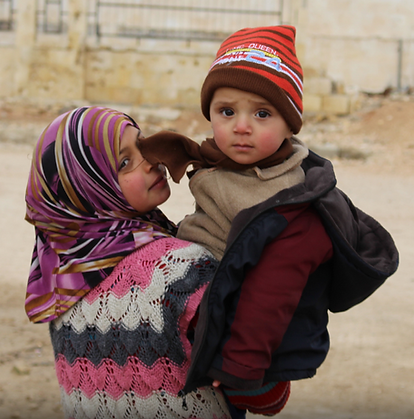
SYRIAN REFUGEE CRISIS
Babisqa, Syria
A man sits with his children at the remains of an ancient church in the village of Babisqa, Syria.
On November 7, 2020. His home was destroyed by the Syrian government shelling.
© 2020 Anas Alkharboutli/picture-alliance/dpa/AP Images
AT A GLANCE
WHO
2.5 Million
Syrian
Children
WHY
Civil war in Syria
NEEDS
Food
Water
Medical Care
Immunizations
Education
Child Safe Spaces
Shelter

Syria
THE CAUSE
Government violence and ensuing protests erupted into civil war,
forcing 14 million Syrians to flee in search of safety.
The crisis began in 2011, when the Syrian government violently cracked down on public demonstrations in support of children arrested for anti-government graffiti. The conflict escalated, and the country plunged into a brutal civil war. Indiscriminate killings, aerial bombardments, chemical weapon attacks and modern-day sieges blocking food and humanitarian aid forced millions of Syrian families to flee their homes. Furthermore, the war caused widespread destruction, leaving behind poor infrastructure and uninhabitable towns and cities.
IMPACT ON CHILDREN
Syrian refugee children trapped in this decade-long crisis face countless barriers to education, mental health and livelihood.

Syrian refugee children trapped in this decade-long crisis face countless barriers to education, mental health and lThe Syrian refugee crisis has taken a heavy toll on the well-being and development of almost three million children facing displacement, poverty and trauma.
Trapped in the limbo of life in refugee camps, they face barriers to quality education and healthcare. Many have witnessed the atrocities of war and lost loved ones. They are at risk of mental health issues such as post-traumatic stress disorder, anxiety and depression that, left without proper psychological intervention, heavily undermine their future prospects. They are also vulnerable to exploitation, abuse and radicalization.
Thankfully, global humanitarian organizations such as World Vision and UNICEF, along with Syrian aid groups and regional NGOs such as Bonyan, Near East Foundation and Ghiras Al-Nahda work tirelessly to provide mental health support, basic needs, access to education and future job opportunities.
THE CRISIS TODAY
Living in the world's largest refugee camp, they rely entirely on humanitarian assistance.
It is now the largest refugee crisis in the world, and so long-standing that many Syrian children have never known life outside a refugee camp.
It has now been twelve years since the start of the Syrian refugee crisis, and the situation is more dire than ever. Over half of the entire Syrian population remains displaced. Five million Syrians, mostly women and children, are now refugees living in host countries such as Jordan, Egypt, Iraq and Türkiye. The UN Refugee Agency has been on the ground since the start of the crisis, bringing families lifesaving supplies, shelter, clean water, hot meals, and medical care. The organization also provides vital winter relief items such as warm clothes, sleeping bags and insulation for tents. Together, our global community strives to ensure every child can hold on to their hopes and dreams.


SOURCES
The Red Cross
Martin Edström, National Geographic Explorer
USA for UNHCR
Human Rights Watch
BMC

